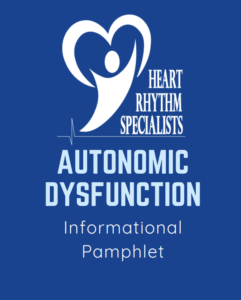What is Autonomic Dysfunction?
Autonomic dysfunction, also known as autonomic neuropathy or dysautonomia, is a group of symptoms that develop as a result
of damage to the nerves of the autonomic nervous system (ANS).
The ANS controls our involuntary bodily functions that we do not consciously think about, such as blood pressure, heart rate, breathing, digestion, and more.
How is Autonomic Dysfunction Diagnosed?
Dr. Yoo will use a combination of a
physical exam, medical history, and
testing to uncover the cause of your
symtoms. The tests will depend on
your symptoms and risk factors;
they may include:
- breathing tests
- tilt table test
- genetic tests
- blood tests
- ultrasound
Risk Factors include:
- autoimmune neuropathies and other autoimmune disorders
- amyloidosis (abnormal protein build-up)
- pre-diabetes and diabetes
- infectious diseases such as HIV and Lyme disease
- nutritional deficiencies
- certain medications
Causes of Autonomic Dysfunction include:
- familial dysautonomia
- idiopathic orthostatic hypotension
- Shy-Drager syndrome
- Parkinson’s disease
- spinal cord injury
Symptoms of Autonomic Dysfunction
Symptoms may include:
- orthostatic hypotension (dizziness,
fainting, dimness of vision, or
weakness upon standing up) - exercise intolerance
- urinary dysfunction
- sweating abnormalities
- gastrointestinal dysfunction (loss
of appetite, diarrhea, constipation,
vomiting, or difficulty swallowing) - sexual dysfunction
- vision problems
- numbness or tingling in extremities or other body parts
- weight loss
Treatments for Autonomic Dysfunction
Treatment of autonomic dysfunction involves first treating the underlying condition and managing specific symptoms. This may include:
- increasing fiber, salt, and fluid intake
- various medication(s)
- eating small, frequent meals
- stress-relieving activities
- avoiding alcohol, smoking, and excessive caffeine intake
- exercise regularly
- maintain a healthy weight
Additional Resources
